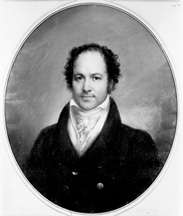Benjamin W. Leigh
| Benjamin Watkins Leigh | |
|---|---|
 | |
| United States Senator from Virginia | |
|
In office February 26, 1834 – July 4, 1836 | |
| Preceded by | William C. Rives |
| Succeeded by | Richard E. Parker |
| Member of the Virginia House of Delegates | |
|
In office 1811-1813 | |
| Personal details | |
| Born |
June 18, 1781 Chesterfield County, Virginia |
| Died |
February 2, 1849 (aged 67) Richmond, Virginia |
| Political party | National Republican |
| Alma mater | College of William and Mary |
| Profession | Lawyer, politician |
Benjamin Watkins Leigh (June 18, 1781 – February 2, 1849) was an American lawyer and politician from Richmond, Virginia. He served in the Virginia House of Delegates and represented Virginia in the United States Senate.
Early and Family Life
Benjamin Watkins Leigh was born in Chesterfield County on June 18, 1781, the son of the Reverend William Leigh (d. 1787) and Elizabeth (Watkins) Leigh (d. 1799). He attended the College of William and Mary, studied law, and began practicing in Petersburg in 1802, as well as helped raise his younger brother William.
Benjamin Watkins Leigh married three times: on December 24, 1802, to Mary Selden Watkins; on November 30, 1813, to Susan Colston; on November 24, 1821, to Julia Wickham.
Career
After representing Dinwiddie County in the Virginia House of Delegates 1811-13, Leigh moved to Richmond, where he rose rapidly in his chosen profession. He prepared the revised Code of Virginia in 1819, was a delegate to the Virginia Convention of 1829-30, a reporter of the Virginia Court of Appeals 1829-41, and was again elected to the Virginia legislature, representing Henrico County in the session of 1830-31. Leigh was appointed by the state legislature as a Whig to the United States Senate to fill the vacancy caused by the resignation of William Cabell Rives; he was reappointed to represent tidewater Virginia slaveholders in 1835.
During Leigh's time in the Senate, the controversy over slavery reached new levels of intensity. The House of Representatives passed a "gag rule" tabling all anti-slavery petitions, and a similar measure died in the Senate, though that body approved an alternate method of ignoring such petitions. President Jackson called on the Congress to censor anti-slavery publications from the federal mails, a bill the Senate defeated 25-19. Leigh proposed a statewide boycott of pro-emancipation newspapers, writing that Virginians had the right "to suppress to the utmost of our power what we deem inflammatory, dangerous, mischievous."[1]
Every State had expressed the disapproval of South Carolina's nullification and it was Leigh who was sent to urge South Carolina to desist from carrying matters to extremities.[2] Leigh served until his resignation on July 4, 1836. Thereafter he resumed the practice of law in Richmond.
Benjamin Watkins Leigh was a founding member (1831) of the Virginia Historical Society and first chairman of its standing committee.
Death and Legacy
Leigh died in Richmond on February 2, 1849, and is buried in Shockoe Hill Cemetery.[3]
His home at Richmond, the Benjamin Watkins Leigh House, was listed on the National Register of Historic Places in 1969.[4][5]
References
- ↑ Dunn, Susan. Dominion of Memories: Jefferson, Madison, & the Decline of Virginia, 195.
- ↑ George Lunt (1866). The Origin of the Late War Traced from the Beginning of the Constitution to the Revolt of the Southern States. New York: D. Appleton and Company. p. 89.
- ↑
- ↑ Virginia Historic Landmarks Commission Staff (March 1969). "National Register of Historic Places Inventory/Nomination: Benjamin Watkins Leigh House" (PDF). Virginia Department of Historic Resources.
- ↑ National Park Service (2010-07-09). "National Register Information System". National Register of Historic Places. National Park Service.
Sources
- Dictionary of American Biography
- Dunn, Susan. Dominion of Memories: Jefferson, Madison, & the Decline of Virginia. Cambridge: Basic Books, 2007
- Hall, Cline Edwin. “The Political Life of Benjamin Watkins Leigh.” Master’s thesis, University of Richmond, 1959
- Macfarland, William H. An Address on the Life, Character, and Public Services of the Late Hon. Benjamin Watkins Leigh. Richmond: Macfarlane and Fergusson, 1851.
- Encyclopedia of Virginia Biography, Volume II
External links
| United States Senate | ||
|---|---|---|
| Preceded by William C. Rives |
U.S. Senator (Class 2) from Virginia February 26, 1834 – July 4, 1836 Served alongside: John Tyler, Jr., William C. Rives |
Succeeded by Richard E. Parker |
